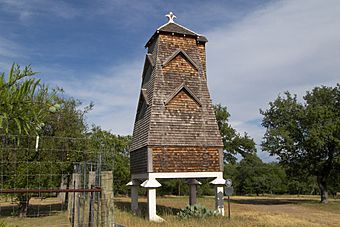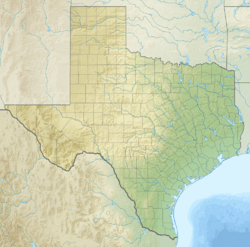Hygieostatic Bat Roost facts for kids
|
Hygieostatic Bat Roost
|
|

Hygieostatic Bat Roost in 2009
|
|
| Nearest city | Comfort, Texas |
|---|---|
| Area | less than one acre |
| Built | 1918 |
| Architect | Charles A. R. Campbell |
| NRHP reference No. | 83003144 |
Quick facts for kids Significant dates |
|
| Added to NRHP | March 28, 1983 |
The Hygieostatic Bat Roost is a unique tower located in Kendall County, Texas. It stands about 1.5 miles (2.4 km) east of Comfort. This special building was put up in 1918. Its main purpose was to attract bats. Why bats? To help control mosquitoes and fight diseases like malaria.
Contents
What is the Hygieostatic Bat Roost?
The Hygieostatic Bat Roost is a tall, pyramid-shaped tower. It was built to be a home for bats. It's located on land that used to belong to Albert Steves. He was a former leader in the city of San Antonio. Mr. Steves asked a health expert, Dr. Charles A. R. Campbell, to design this special building.
Why Was It Built?
Dr. Charles A. R. Campbell was a health officer in San Antonio. He was looking for ways to stop the spread of malaria. Malaria is a serious illness carried by mosquitoes. Dr. Campbell knew that bats eat mosquitoes. He thought that if more bats lived in an area, they could help control the mosquito population.
Fighting Malaria with Bats
Mosquitoes are most active at night. Many of their natural enemies, like birds, are active during the day. Bats, however, hunt for food at night. This makes them perfect for eating mosquitoes when they are most active. Dr. Campbell created a special design for bat roosts. He even got a patent for his idea. A patent means he officially owned the design. He built several of these bat roosts around San Antonio starting in 1907.
How Does It Look?
The Hygieostatic Bat Roost is a tall tower. It stands about 30 feet (9.1 m) high. It has a pyramid shape and is covered with shingles. One small window-like opening, called a dormer, is where the bats fly in and out. Other dormers are just for decoration. The bottom part of the tower allows people to go inside. The concrete base of the tower is raised about 7 feet (2.1 m) off the ground. This was done so wagons could drive underneath. They would collect the guano, which is bat droppings. Guano is a valuable fertilizer.
A Special Name and History
When the bat roost was built, Albert Steves gave it its unique name. He called it "Hygieostatic Bat Roost." This name comes from two Greek words: hygiea, meaning "health," and stasis, meaning "standing." So, the name means something like "standing for health." The family of Albert Steves still owns the land where the tower is located today.
Honoring Its Past
The Hygieostatic Bat Roost is an important historical site. In 1981, it was recognized as a Recorded Texas Historic Landmark. This means it's a special place in Texas history. Then, in 1983, it was added to the National Register of Historic Places. This is a list of places across the United States that are important for their history or architecture.
 | Madam C. J. Walker |
 | Janet Emerson Bashen |
 | Annie Turnbo Malone |
 | Maggie L. Walker |



